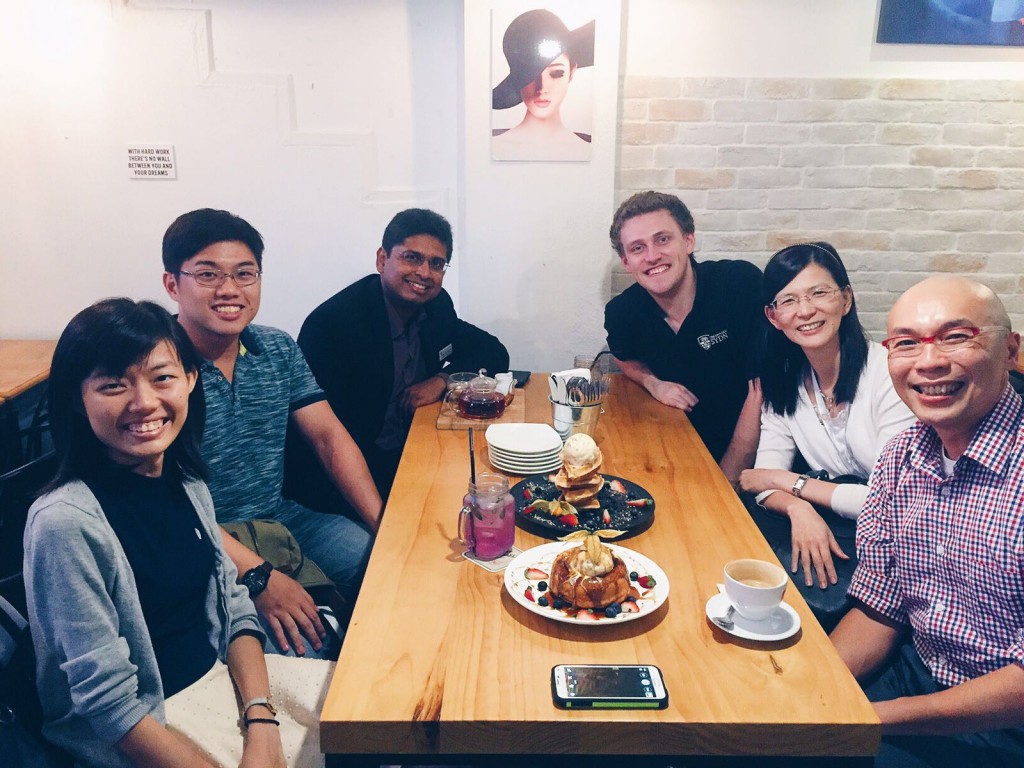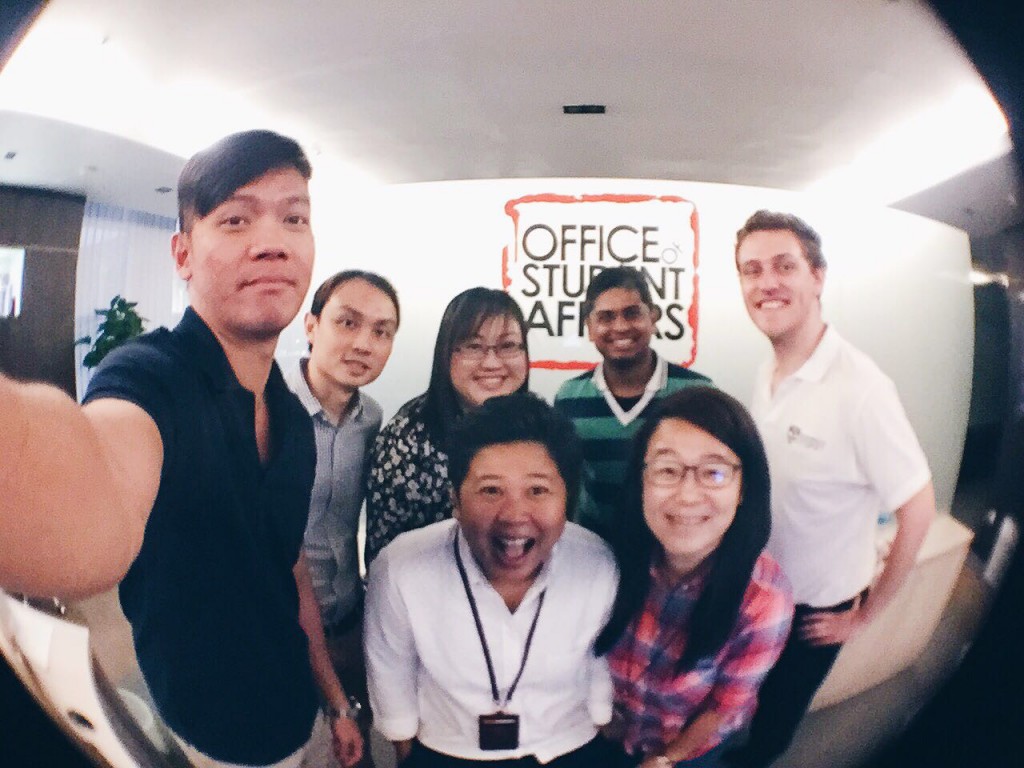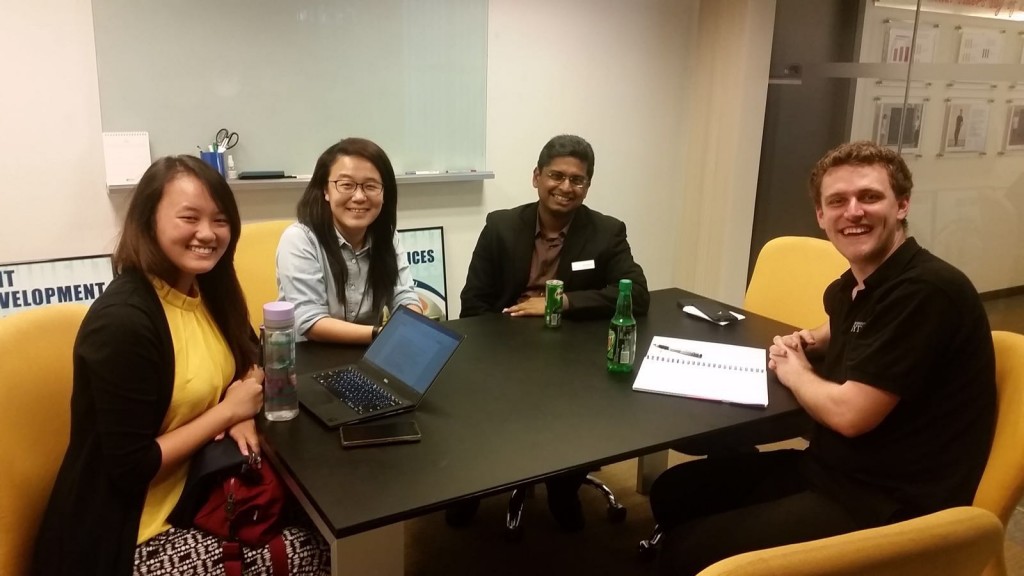Last week we had a chance to talk with two lovely guests, Dr Ashvin Parameswaran and Mr Casey White, from the University of Sydney. Dr Ashvin is the Head of Accommodation and Financial Services, while Casey is a Student Experience Officer. Both of them were here on a study trip to find more about residential life at NUS. Read on to find out what motivates them, and what makes them tick!
Dr Ashvin, we hear that you’re Singaporean, and you were from NUS! What did you study?
A: I did my Bachelor’s in Economics and South East Asian Studies, after which I went to Australia to do my PhD in Asian Politics, Economy and Religion. I used to be a lecturer for a couple of years before moving into management and student services.
What about Casey?
C: I studied music, majoring in opera singing and conducting, at the Australian National University (ANU) where Ashvin did his PhD. I’m about to start my Master’s degree at the University of Sydney in education management.
How did both of you get into this profession?
A: I’ve always believed that universities have too much of a divide between the academic staff and professional services staff. I’ve always wanted to bridge that gap so that when a student comes to any office, they can be confident that they’re getting a quality education. It also means that the staff at the backend are not afraid to talk to each other – it’s not two different worlds, it’s the same world that is trying to build a great experience for the students.
C: For me, it was by accident, really. I went to college with the intention of being a music teacher, then I found this whole world in university housing and became very interested in it. So it sort of snowballed from there – I started applying for positions and was fortunate enough to get this role, which has really expanded my horizons and my mind. My work is a constant source of fascination for me.

Having dessert at Cheng’s, a dessert shop along the Fong Seng stretch.
From left: Ms Tee Li Hua (RA), Mr Samuel Wee (RA), Dr Ashvin, Mr Casey White, Ms Ong Poh Suan (OSA), Mr Alan Soong (Resident Advisor).
Is it common in Sydney to live on campus? Or do students prefer to live elsewhere?
A: Well, in the US or the UK, there’s a bed for every three to six students, while in Australia, it is for every eleven students. So you see what I mean when I say that there’s a huge undersupply. A lot of students would definitely prefer to stay on campus because it’s safer, cheaper, and more educational, but unfortunately they cannot get a space.
Roughly, how many residences do you have on campus in University of Sydney?
A: We can divide them into three kinds of residences – we have seven residential colleges, which is probably equivalent to your halls, and we also have our new halls which will be more academic, and a lot of partnerships with private providers specialising in building student accommodation. These are quite expensive, but very safe and purposefully built for students. So the total would be about 12 to 15.
Does each of the residence in University of Sydney have different cultures or unique characteristics?
A: One type of residence we’re building is planned to be smaller and to involve very academically intensive experience. This would form about 20% of our beds. Our existing colleges and halls will be sort of a middle layer and form 60% of our beds, involving a lot of social and academic activities which are more voluntary, meaning that you could, but are not forced to, participate. And then the last 20% belongs to the third layer, for more niche markets like families, hotels, or specialised facilities for overseas programmes. So that’s what we’re planning to have, but right now it’s still sort of messy and complex.
Other than being a cheaper alternative, what do you think are the benefits of living on campus?
C: The biggest benefit is probably that you can walk into a hall and instantly find people you have common interest with, and can relate to on some level. Housing can help bring 60 thousand residents in University of Sydney down to a smaller community. I feel that it’s really important to not just become another person in the crowd, especially in big organisations where you may feel like just a number in a sea of people. The long-term benefit is having a huge web of connections across the world, especially in universities that put a lot of focus on international diversity.
Do you have Resident Assistants (RAs) too?
C: Yes, we also have RAs. They function a little bit differently because they don’t have night duties , but they’ve got pastoral care and community development responsibilities for their floors.
A: They’re not on duty because there’s a night manager responsible for that. We made a decision that risk should generally be transferred to full time staff, but our RAs do get basic first aid training in case they are needed for it.

After a meeting between Dr Ashvin, Casey and the Residential Life team from OSA.
Front, from left: Mr Tay Guan Hock, Ms Mimi Ahmad, Ms Bell Yeo.
Back, from left: Mr Elvyn Sim, Ms Ann Tan, Dr Ashvin, Mr Casey White.
What are some of your signature residential programmes?
C: One programme that we have is called Intramural Sports.It is the first inter-residence sporting competition to be started in the University of Sydney in 110 years! We have two big trophies to be won, and they are named after Olympians from the University of Sydney, Thomas Whalan and Liane Tooth. It is projected to be the biggest inter-residence sporting competition in Australia by 2020!
A: Another programme that we have is called Project 100. There was a statistic published in Australia on how 42% of first year students said that not a single staff member knows them by name. Plus, 26% of that same cohort said that during the first year, they don’t even have one or two friends! That’s terrible. So Project 100 is our attempt to ensure that every first year student has a personal interaction with a staff member from the central office, within the first three months of arriving at University. The staff either calls them, or goes to meet them, or the students can come to the office, basically just having a general chat. By doing that, we hope that 100% of them feel that at least someone cares about them and knows them by name – hence Project 100. This goes together with our birthday programme, where every student gets an email and a small voucher on their birthday.
Are there any difficulties that you encountered in your job? How do you overcome them?
A: Many universities here put residences on the edge of campus, mainly because residential life is not seen as a core part of the university. So I think the most difficult thing for me has been to try to challenge that assumption. I want to make people realise that if you are living in a place for 18 hours a day, there’s no such thing as neutral – the environment is going to have either a positive or negative impact on you. We might as well make it positive!
C: For me, the first one is trying to explain to people what I actually do because it’s a job where you do so many different things. Even my own immediate family still doesn’t really get it. The other challenge for me is working out what’s going to be best for our students – there are just so many fun things that you can do!
If you could describe your career in one word, what would it be and why?
C: I’d say adventurous. Because it wasn’t what I planned and I’ve seen so many things that nothing really surprises me anymore these days!
A: Transformational. I educate, run operations and do financial management, but ultimately I think we’re changing lives. We’re not doing it in a flashy way, but in a quiet, but meaningful and enduring way.
